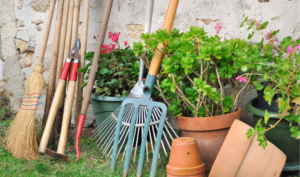
Essential Tools for Effortless Gardening
Looking to fill up your garden shed but not sure where to start? We’ve compiled a list of five essential tools you’ll need for your
28-30 Papagni Avenue, Newton | 48 Tiver Road, Evanston South | 526 Waterloo Corner Rd, Burton
OPEN 7 DAYS
What is a Soursob?
Scientific name: Oxalis pes-caprae
Soursobs are regularly confused with creeping Oxalis due to their very similar leaf appearance. Soursobs spread with large heart shaped leaves along the ground, producing flowers with 5 petals and have a long white tuberous root. Cooler conditions are when Soursobs like to appear in Autumn and Winter. The problem with Soursobs is that they are extremely resilient to herbicides and have a fast-growing system of onion like bulbs growing beneath the surface. In addition to this, they have small secondary bulbs known as bulbils. These bulbils are attached to the root system and each Soursob can have as many as 20 bulbils! When you remove the plant, the bulbils are left behind that then detach and grow into a new plant and the cycle continues.
One of the most important things to do is to try and target Soursob before it flowers. It is when it is flowering that the bulbils are growing and creating more plants.
Flowering times:
How to remove Soursob
Completely eradicating Soursobs from your lawn will take a bit of time and effort. Unlike many other weeds, it is not recommended to remove them by hand, as the bulbils will break off and continue to grow beneath the soil allowing it to reappear. There are also no selective herbicides readily available for domestic lawns that will target the Soursobs, so you will need to take a few other steps to try and remove it. Mowing them off regularly will weaken the plant helping your grass to overcome the infestation. Bulb exhaustion occurs just before flowering, so this is the perfect time to implement your mowing and non-selective herbicide application, when the plant is weak. This is the only stage that physical removal will be an option, by digging up under the plant and removing the soil around it as well.
You will be able to tell the plant is at the exhaustion stage if you carefully dig up a plant – the adult bulb will be shrivelled and the root under the bulb won’t have grown yet or is extremely young and thin. Spot spraying carefully or using a weed wand with an application of Glyphosate (Round Up or Zero) will be your best course of action, but you must be careful when applying as it will kill your turf as well. Acting quickly will also help you to stop them in their tracks before they produce more bulbils.
Thanks to Lawn Solutions Australia for this handy information.
Related Products.
Expert advice from the Newton’s crew, ask away.
Copyright © 2022 Newtons Building & Landscape Supplies all rights reserved | Term & Conditions | Privacy Policy
Newtons Building and Landscape Supplies has a huge range of products for tradies, builders, and DIY enthusiasts. From sand, metal, and rubble to cement products and masonry blocks, we have everything you need for your building or renovation project.
Discover the benefits of Hebel, the high performance building product made from Autoclaved Aerated Concrete (AAC). Newtons Building and Landscape Supplies are proud to stock Australia’s only manufacturer of AAC by CSR Hebel. Experience the durability and versatility of Hebel blocks and panels for your next construction project.
Newtons Building and Landscape Supplies is your one-stop-shop for irrigation needs. Our range includes rural and domestic irrigation products and systems, poly pipe, sprinklers, valves, irrigation controllers, poly fittings, and more.
Newtons Building and Landscape Supplies have a huge range of landscape garden supplies available. From mulches and ground covers, fertiliser, turf to compost, soil and loam, we have it all. With over 6000 products so you can be sure that we have everything you need to build the perfect home and garden.
From patio pavers to garden edging, Newtons Building & Landscape Supplies has you covered. Our Adelaide paving centre offers a massive range of products, including modern and traditional sleepers for retaining walls and more.
Newtons Building and Landscape Supplies has everything you need for rainwater tanks, pumps, pump repairs, and drainage solutions. We sell top brands like Maxiplas, Amari, Bushmans, Team Poly, and more. Our expert staff can help you choose the right product for your needs. We also offer custom-engineered sump and pump packages for hassle-free installation.
Explore the best professional-grade tools and safety equipment at Newtons Building and Landscape Supplies. We stock a wide range of high-quality tools and safety equipment for professionals and DIY enthusiasts. With specialised tools for bricklaying, concreting, landscaping, plastering, and tiling, we have the right tool for every job.
hop the best artificial turf, instant lawn, and fertiliser supplies at Newtons Building and Landscape Supplies. Our range includes a variety of options to suit your needs, from natural-looking synthetic grass to lush, green instant turf. We also stock a range of accessories to make installation a breeze.
Looking for purified water in your home? Newtons Building and Landscape Supplies offer a range of water filter systems to suit your needs. Choose from undersink filter systems that turn your existing tap into a filter tap or whole house systems for chemical-free water throughout your home.

Looking to fill up your garden shed but not sure where to start? We’ve compiled a list of five essential tools you’ll need for your